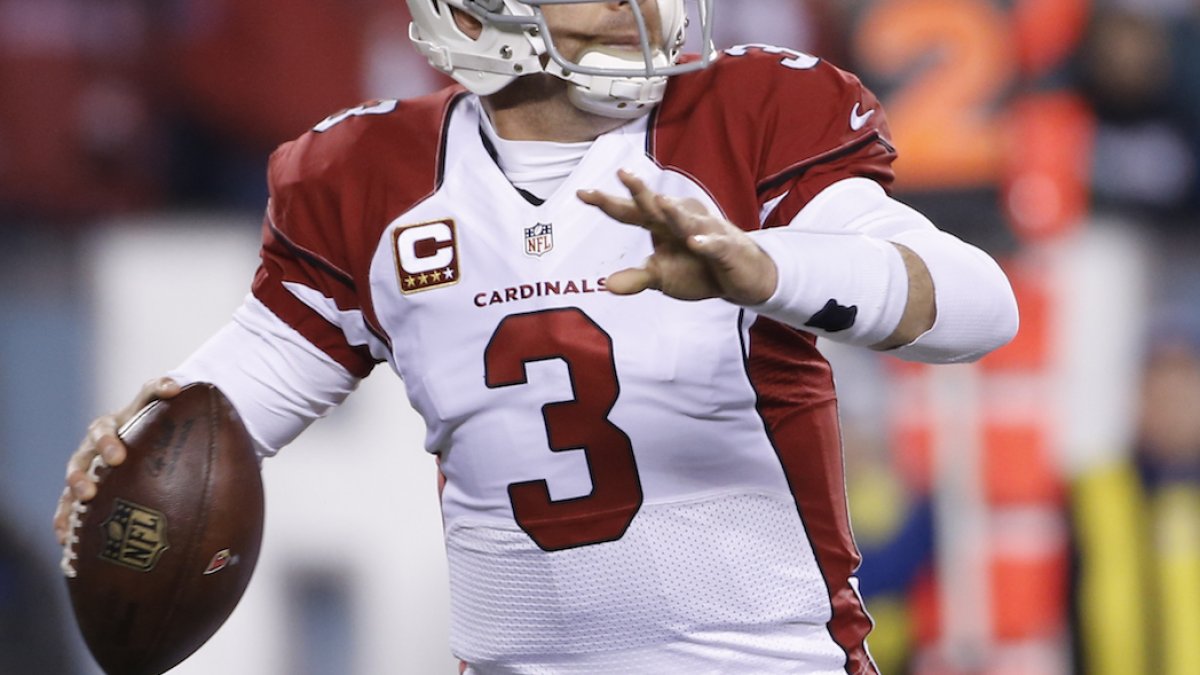MVP is always one of the most hotly-contested awards, due to the simple fact that there’s no working definition of “value” across all voters. So, we’ll start off with how the PFF team defined value.
Pro Football Focus selected players based on their total impact above a replacement level player for every single snap they played this season, obviously using our grades as a guideline. The quarterback position has, by far, the lowest replacement level of of any position we’ve calculated. A QB also can significantly impact a high percentage of plays, so naturally, they are our first choices for MVP. Wins and losses are not factored in, as we are looking solely at the individual. It’s also important to note that these decisions were made irrespective to supporting casts.
Winner
Carson Palmer, QB, Arizona Cardinals
No one was even close to being as consistent as Palmer game in and game out. It was a truly dominant season, nearly on par with those we saw from Aaron Rodgers and Drew Brees in the “Year of the Quarterback” back in 2011. Palmer didn’t have a single game graded negatively, and only three of his games earned a grade lower than +2.0 (0.0 for a game is average). The reason? Downfield accuracy and efficiency, the likes of which we haven’t seen in the PFF era.
It’s easy to look at Palmer’s 63.6 completion percentage and declare him inaccurate, but that disregards the fact that his average depth of target was the deepest in the NFL this year (11.3 yards downfield). The average completion percentage in the NFL on throws targeted between 10-20 yards downfield was 54.6 percent—Palmer’s completion percentage on those same throws was a ludicrous 62.6 percent.
It follows naturally that Palmer would have a ton of his yards come before the catch. He was only fourth overall in total yards passing (4,671), but in terms of air yardage, Palmer had the most in NFL by almost 200 yards (2,923). His 5.4 yards in the air per attempt was the highest we’ve seen in our nine seasons of charting, and over half a yard better than Cam Newton’s.
Maybe the most amazing part of it all is that it came seemingly out of nowhere. The highest Palmer had ever previously finished in PFF's QB rankings for a season was 10th, and that was all the way back in our first year of grading, 2007. At 36 years old, Palmer had an all-time season in him.
First runner-up
Cam Newton, QB, Carolina Panthers
Newton showed this season that when you put him behind a competent offensive line, he can make magic. PFF has always graded Newton out well as a passer in the past, despite having bland stats, but this year he took it to the next level, as he cleaned up the issues with his decision-making that hampered him in the past. In his first four seasons, his turnover-worthy throw rate was at 3.7 percent—that dropped to 3.1 percent this season. This also coincided with a jump in his big-time throw rate going from 6.1 percent of his attempts to 7.0 percent. That’s a fancy way of saying he was throwing to more open guys down the field than covered guys.
What really bumps Newton up is his work in the run game. His running grade was the highest of any quarterback in the league this year, but it’s still difficult to quantify all the ways his mobility impacts a defense. Newton had 92 designed runs this season, averaging 4.75 yards per attempt on those carries, scoring nine touchdowns, and converting 30 first downs.
The biggest thing keeping Newton from the top spot? His stretches of inaccuracy. His 71.9 accuracy percentage was good for only 20th in the NFL. That’s to be expected to some degree, having the second-highest depth of target in the league (10.9 yards downfield), but he had by far the most throws graded at -0.5 (simple misses) of anyone on this list.
Second runner-up
Tom Brady, QB, New England Patriots
After a scintillating start to the season, Brady limped into the barn a bit without Julian Edelman or any semblance of an offensive line. It was still easily the best football we’ve seen Tom Brady play since 2011, and would have been MVP-worthy in most other years.
Third runner-up
Russell Wilson, QB, Seattle Seahawks
He wasn’t even in the conversation through the first half of the season, but closing out the year with the third-highest grade over his last seven games nudged him into the conversation. His 78.4 accuracy percentage was the third-highest in the league.
Fourth runner-up
Ben Roethlisberger, QB, Pittsburgh Steelers
Roethlisberger played as well as anyone else in the league when healthy this year, but missing four games ruins any serious MVP consideration. Roethlisberger couldn’t provide the same impact that others could in only 12 starts. He still finished with five games graded higher than +5.0 (0.0 is average), the most of any QB.
For more PFF awards, visit the following pages:
Dwight Stephenson Award (best player in NFL)
Most Improved Player of the Year
Thanks to the support from the Ohio Film Office.



 © 2025 PFF - all rights reserved.
© 2025 PFF - all rights reserved.